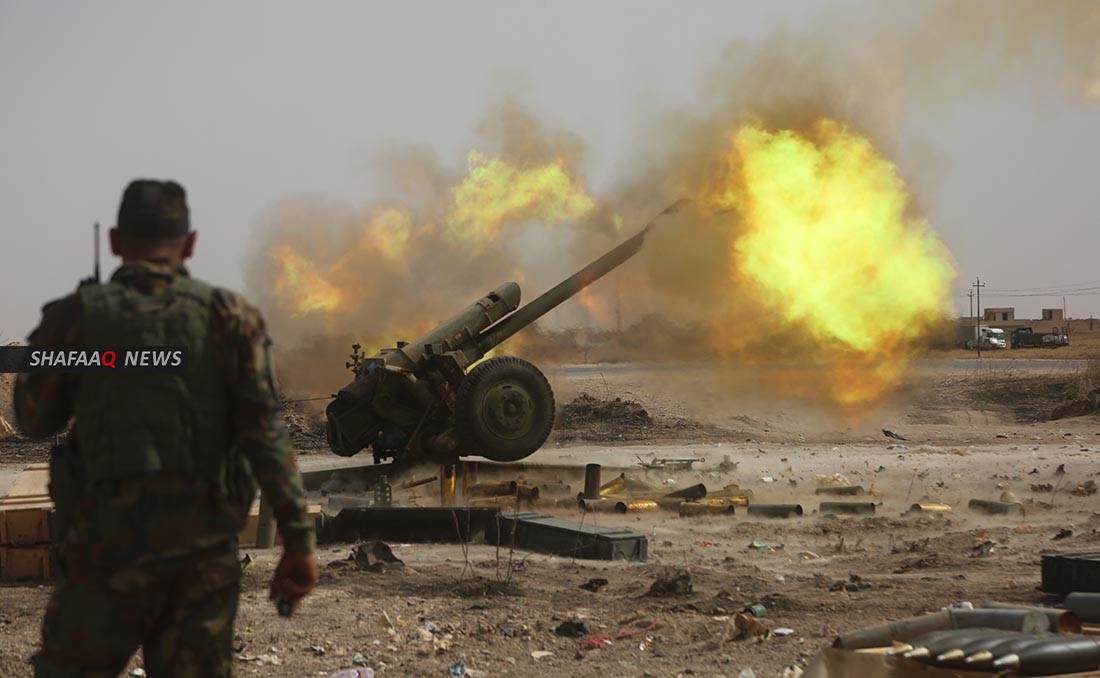ISIS regrouping in Iraq.. Baghdad needs Kurdistan more than ever

shafaq news/ A lot of factors, including the Coronavirus, enabled ISIS to escalate it’s attacks in Iraqi cities, especially in the past few days as it took a bolder bloody form, which imposed the necessity of activating military cooperation between Baghdad and Erbil, Especially since some of the attacks targeted conflict areas between the two sides.
ISIS didn’t only exploit the corona epidemic, but also the “security gap” that’s resulted from baghdad’s absence from military cooperation with the peshmerga in the disputed areas, to launch a series of attacks in Diyala, Salah Al-Din, Anbar, Nineveh and Kirkuk.
As the Chief of Staff of the Peshmerga Forces, Lieutenant-General Jamal Aminiki called for a complete coordination and cooperation between the Iraqi and the Peshmerga forces after the increased terrorist attacks, especially in the disputed areas.
The terrorist activities in the north, central and western regions of Iraq, benefitted from a combination of factors, including in addition to the "security gap", the retreat of many security forces in light of the measures to prevent the Corona epidemic, also to the US military repositioning operations and withdrawals from Nineveh and Kirkuk during the past months, all of which allowed the leader of ISIS Abu Ibrahim al-Qurashi to demonstrate the effectiveness of his leadership by carrying out specific operations, such as suicide attacks, in the past few days.
Since the assassination of Abu Bakr Al-Baghdadi on October 26, 2019, questions have been raised about whether his successor, Abu Ibrahim al-Qurashi, will be able, with the defeated strongholds of terrorists in Iraq, Kurdistan and Syria, and the killing of many of his leaders, to return to the militant ranks and launch initiative terrorist attacks, especially during Ramadan, which forms an ideological occasion for the organization’s followers to confirm their presence in the field.
The cooperation between Baghdad and Erbil is essential, for the reports about ISIS show more organized operations, Advanced field and security information gathering capabilities and an increase in the followers.
The associated press quotes a peshmerga officer, “ the terrorists’ militants are offered shelter, food, transportation and cooperation from local sympathizers “
Although Jamal Aminiki confirmed that the conditions that allowed ISIS to have extensive control in 2014 are currently unavailable, this does not diminish the importance of activating communication and military cooperation between Baghdad and Erbil in the coming days because ISIS didn’t show any calm or compassion behavior neither in Iraq and Kurdistan nor in Syria and Lebanon.
Both Kurdistan and Baghdad governments did well by agreeing to hold a military meeting where an Iraqi military delegation led by Lieutenant-General Abd Al-Amir Yar Allah will visit Erbil to discuss cooperation with the Peshmerga forces in combating ISIS, according to the Agence France-Presse, senior officials in the Peshmerga repeatedly warned Both the Iraqi Government and the international community from the potential of ISIS’s threat escalation of continuing to carry out attacks.
The Kurdish officials certainly minded the massive bloody attack launched by ISIS on April 9 in several locations of the Syrian army, in Homs and Deir Al-Zour on the border with Iraq, which forced the army to use the Russian Air Force to stop the invasion that caused gas fields to stop the production and disturb large areas of Surai's electricity supply.
About the danger of ISIS exploiting the "security gap" in the disputed areas with the withdrawal of many American forces, the Associated Press quotes the Deputy Prime Minister of Kurdistan, Qubad Talabani, “The threat is real, They are moving and killing in the north and will start hitting Baghdad soon," confirming that ISIS will take advantage of the gap between the Peshmerga and the Iraqi forces that’s caused by political conflicts.
Iraqi Security officials fear that the hundreds of ISIS members who escaped the Syrian prisons during the Turkish attack on Kurdish areas in northern Syria, managed to infiltrate into Iraq, which would increase their bloody attacks, as is currently happening.
Previously, the US Department of Defense announced that ISIS still has 14,000-18,000 active members in Iraq and Syria, while Dana Stroll, the former pentagon official stated, “ just as killing Osama bin Laden didn’t end Al-Qaeda, I don’t think getting rid of Al-Baghdadi will end ISIS”
Associated Press quoted a senior Iraqi intelligence official “before the emergence of coronavirus and the withdrawal of US forces the attacks were minor and one operation per week" while now it has reached an average of 20 operations per month.
According to Kurdish officials, the Peshmerga have already reached agreements to enhance cooperation with the Iraqi forces, yet it was never implemented.
while waiting for Baghdad to show more flexibility in dealing with the military coordination file with Erbil to confront ISIS, field data show that surrounding ISIS's increasing threat and getting rid of it may be difficult unless this threat is dealt with in a broader regional way, for ISIS's ability To infiltrate the borders between Iraq and Syria back and forth, will make it almost impossible to completely eliminate it.
Meanwhile, the matter of having a Baghdad-Erbil-Damascus security agreement is becoming more urgent than ever, just as having an agreement between Baghdad and Erbil about the disputed areas, due to the problems of the US military’s presence in the east of the Euphrates in Syria, in the absence of coordination between them and Damascus, for it makes the Iraqi-Syrian border more penetrable.
Contrary to these multiple equations, Abu Ibrahim al-Qurashi may be the master of sectarian hatred in the coming weeks, using the gaps of disputes and miscalculations for his advantage.